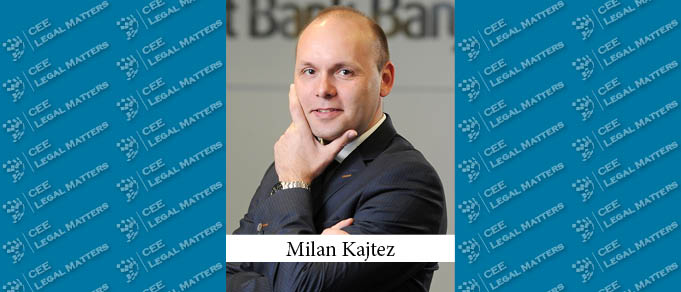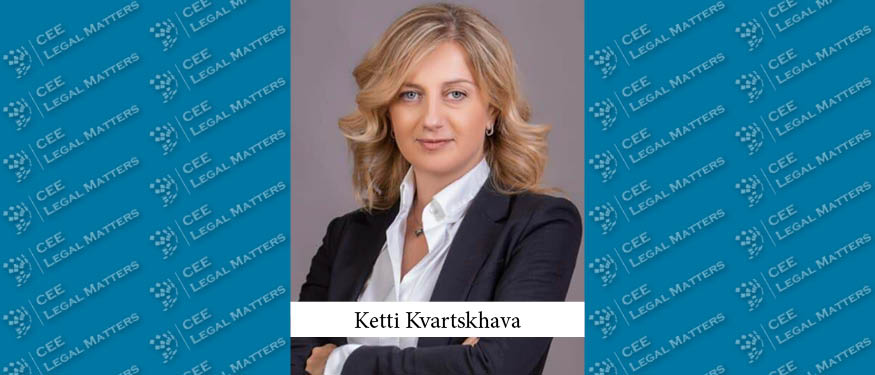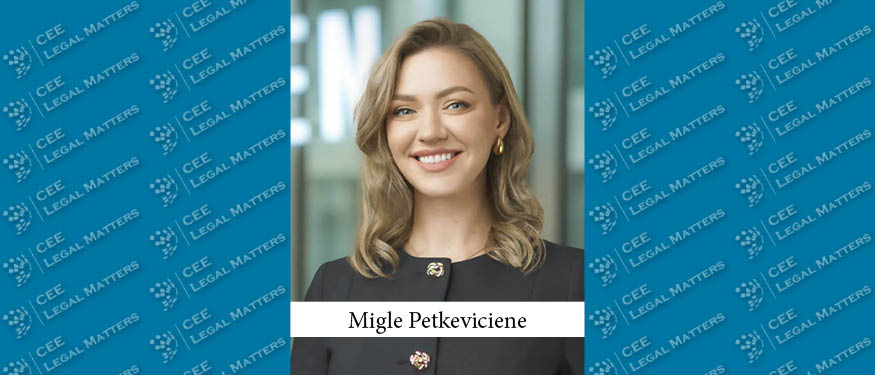An interview with Milan Kajtez, Head of Legal at UniCredit Bank a.d. Banja Luka about his background and best practices.
CEELM: Can you walk us through your career leading you up to your current role?
Milan: After graduating from the Faculty of Law of the University of Banja Luka in 2005, like all young people in Bosnia and Herzegovina, my job search involved sending CVs and cover letters for all open positions. After six months of searching, in the same week I received an offer to work as an intern in the City Administration of the City of Banja Luka, in the District Court in Banja Luka, and in Nova Banja Luka Bank (the legal predecessor of UniCredit Bank a.d. Banja Luka). I didn’t need to think for a long time – I decided to try my hand at banking. I was driven by pure curiosity: What does a banking lawyer do?
I started as an intern in the Legal Affairs Department, with the usual internship run-in and experience. At that time, the focus of the Legal Affairs team was on representing the bank in court proceedings mainly involving the collection of overdue receivables, so my first knowledge of banking was actually built from the end of the banking process, from the collection of bad loans.
Meanwhile, the role of lawyer in the bank started to become increasingly important in the areas of preventive action, legal risk management, and support of sales processes in the phase of their creation.
After completing my internship and several years of work in the Legal Affairs Department, I was given the chance to join the Risk Department team. I spent 12 months there, and after that I returned to Legal Affairs as the Head of the Legal Support Department for corporate clients. I spent five years in that position, after which I moved to the position of Director of Operational Support. There I had the opportunity to manage a team of 50 employees – 10% of all employees of the Bank – divided into six departments and nine functions (in that role I managed all payment processes; card, documentary, and letter of credit operations; credit and bookkeeping administration, cash banks through the central treasury; interbank settlement transactions; and so on). After 14 months of great experience in other types of back office jobs and other types of risk, I returned to the position of Director of Legal Affairs, where I am today.
CEELM: What are the most significant changes you’ve seen in Bosnia & Herzegovina’s legal market over your career?
Milan: The most serious legal changes in the banking business took place in the standardization and implementation of the corpus of rights of financial service users. This is a very complex and demanding package of obligations on the part of banks, which enables a kind of systemic protection of individual users of financial services. Normatively, the banking system has implemented all the requirements through its acts and processes, and as a next step, I believe that we should all work together on additional financial literacy of clients, especially in the use of so-called digital business channels.
In addition, in the normative sense, we have been in need of a clearer and more supportive legal framework for digital business for several years. Banking is largely committed to the implementation of IT technologies and solutions in business processes, but in order for the legal profession to adequately consider the legal risks that this transformation will undoubtedly bring, it is necessary to know how the legislator thinks and wants to see this step in business. Until then, we consider not only the legal risks, but also, in part, the possible wishes of the legislator and the attitudes of the institutions where our open legal risks will end in the future.
In addition to innovations in the field of protection of users of financial services, in recent years, a serious normative emphasis has been placed on the protection of personal data, and the prevention of money laundering and terrorist financing.
In procedural terms, the most significant challenges of the legal environment in Bosnia and Herzegovina are the constant strengthening of legal security through the dedicated work of the country’s judicial, administrative, and regulatory institutions.
CEELM: Why did you decide to join UniCredit?
Milan: At the very beginning, I emphasized that pure curiosity took me into banking, and I was kept there by the great opportunity for development, above all, within the economic and legal fields of legal science.
I think that banking offers the broadest legal view of the life of a company. The procedure of formally establishing a company begins with the opening of a temporary bank account, and closing the company through bankruptcy proceedings always ends with closing the bank account. Between these two key points of a company’s life, we have the opportunity to socialize with our clients through total transaction operations (including domestic and foreign payment transactions and forced collection operations for third parties) and deposit, card, credit and investment activities. We go through every good development with our clients and all the bad, and everything that happens in the business of a company, in principle, will be reflected in its relationship with the bank.
Additionally, UniCredit is dedicated to developing its employees and processes through the group’s fundamental values, so you get a great opportunity to learn and develop in a field that interests you and at the same time are supported in doing the right thing, so being part of this a privilege.
CEELM: Tell us about your legal department. How big is your team, and how is it structured?
Milan: My team consists, on the one hand, of great associates, young lawyers, and bank employees, and on the other hand, equally dedicated external advisors, lawyers, and other associates. The bank’s internal resources are more focused on supporting business and other internal processes, while we use the services of external advisors and lawyers to support the bank’s interests before judicial and administrative institutions, and to make business decisions accompanied by unusual legal risks.
In this way, we have provided a diversity of knowledge and skills from a fully centralized team, as well as obtaining more specialization in certain areas, which has further strengthened the bank’s position when it comes to legal risk management.
CEELM: What is your typical day at work like?
Milan: Execution and discipline in enforcement is of paramount importance for managing the legal risks of a system such as the bank’s, so my usual work day begins with a review of the activities planned for that, or the next few days.
My focus is on supporting our business projects, and I am in constant communication with regulatory bodies in order to monitor and implement regulatory requirements, and I am committed to managing court/administrative proceedings of systemic importance to the bank on a daily basis. I dedicate most of the working day to achieving goals through activities in these areas. In parallel, I monitor the activities of the internal team, as well as open topics with external associates and lawyers.
I highly appreciate every effort to improve any existing process, so I use every free moment to support initiatives on this path.
CEELM: Was it always your plan to go (and stay) in-house, instead of spending time in private practice?
Milan: The development topics and opportunities in the bank is significant and as long as I feel satisfied both at work and in my private life, my plan is to continue working exclusively on upgrading my professional career within the framework of the previous 15 years of life and work.
CEELM: What was your biggest single success or greatest achievement with UniCredit in terms of particular projects or challenges? What one achievement are you proudest of?
Milan: My biggest individual success with UniCredit was getting UniCredit’s 2013 “Up” award, honoring “the best customer service story as well as the best product, service, or initiative representing top excellence in delivering a positive customer impact.” In 2013, I applied for the UniCredit Group competition, based on the improvement I suggested to the bylaws of the Ministry of Agriculture in the Government of Republika Srpska, which would enable beneficiaries of incentives from the ministry much easier access to funds than was at the time standard. I, on my own initiative, recognized the gap in the bylaws, proposed amendments to the act (with an accompanying analysis), and forwarded them to the competent authority for consideration. My initiative was recognized by the ministry and implemented in its acts, thus enabling a much more efficient payment of incentives for agricultural producers. Of course, the banking sector as a whole was involved in this business, not only UniCredit, but as the initiative came from UniCredit employees, at that time it was an important reputational activity on the part of the bank as well.
This initiative was recognized not only by the Ministry of Agriculture, but also by the employees of the UniCredit Group, who that year chose and gave me UniCredit’s “Up” award for my initiative.
I decided to share this story, not only because it is the highest recognition I have received as an employee of UniCredit, but also to encourage every hardworking and creative person to follow his or her inner initiative and believe in everything that seems possible. The business environment is not perfect, nor will it ever be, and we are all invited to perfect it. Try it!
CEELM: How would you describe your management style? Can you give a practical example of how that manifested itself in the legal department or helped you succeed in your position?
Milan: As Director of Legal Affairs, I would say that I manage by example. This is natural, since I grew up as a lawyer at the bank, and for years I have been part, or creator, of a significant part of its processes and changes, both internal and legislative (through participation in various working groups, teams, etc.). Many years of experience, built not only over time, but with very clear goals and supporting activities, determined the framework of my development, and ultimately the leadership style. This opportunity provides a certain comfort zone for me as manager.
This style of leadership helps me implement the bank’s fundamental values through employees, associates, and processes, and helped me as a manager strengthen my listening skills, because when working in a familiar environment you can be misled into thinking you know everything.
CEELM: What one personal best practice or strategy have you invented or developed that helps you in your role that you could recommend to others?
Milan: It is not unique, but in our business environment it is unusual. I improve my business goals, activities, and work models at regular intervals using business coaching services.
During my career, from time to time I came in contact with the concept of coaching, and after the first experience with a coach, I became convinced of the usefulness of this model of work.
Today, when I am faced with a new challenge and/or topic, I know exactly when I will provide adequate support and additional space for thinking through coaching. We’re not all coachable, and the only way to figure out if we are is to try. It’s worth a try!
CEELM: What one person would you identify as being most important in mentoring you in your career – and what in particular did you learn from that person?
Milan: I learned great things from a great man and manager, the bank’s former CEO, Mr. Ivan Vlaho, and one of the things I learned from him – often a truth that helps me in my work – is that the director must have a focus on his topics, and that not all topics are his. “
At the very beginning, as a young lawyer and a future banker, the support of my colleagues was extremely important to me.
The first year or two, you are in the learning phase, and the available support you have is very important. After that, you have enough knowledge and responsibilities to work independently, but perhaps more importantly, to take initiative. Then one enters the phase in which the system expects the energy of change from a young colleague, and a young man can start to feel like the creator of the system for the first time. This recognition of the expectations and activities between the system and the individual I think is very important for any company.
In terms of development and movement along the hierarchical ladder, in addition to the bank’s commitment to employee development and the selfless support of the CEO and other members of senior management, it is important to work independently on building your own capacities. I believe that this kind of cooperation and synergy guarantees growth, success, and mutual satisfaction.
CEELM: On the lighter side, where do you take visitors to Banja Luka? What’s the one place a visitor should make sure to visit?
Milan: Banja Luka is in the immediate vicinity of the three capitals (Sarajevo, Belgrade, and Zagreb), and has mostly borrowed its institutional capacity from them. This has allowed the city to remain clean and peaceful, bathed in positive energy and a comfortable place to live. It is this relaxed course of the day that is the most beautiful thing in our city, wherever you go. And if you have the opportunity for more, do not miss a ride on the river Vrbas, either in organized rafting tours or in the Dajak Boat. Try the Trappist cheese, which has been produced for over 100 years in Banja Luka’s Marija Zvijezda Trappist monastery according to a secret and original recipe, and refresh yourself with Banja Luka’s Nektar beer.
In the immediate vicinity of Banja Luka, you can enjoy the great outdoors, especially if you are a fan of hiking or riding mountain-bikes, appreciate swimming in mountain lakes and rivers, distinguish edible from inedible mushrooms, or simply want to treat yourself to a significant amount of negative ions.
In any case, for any variant you choose, the UniCredit Bank ATM network is at your disposal.
This Article was originally published in Issue 7.9 of the CEE Legal Matters Magazine. If you would like to receive a hard copy of the magazine, you can subscribe here.













